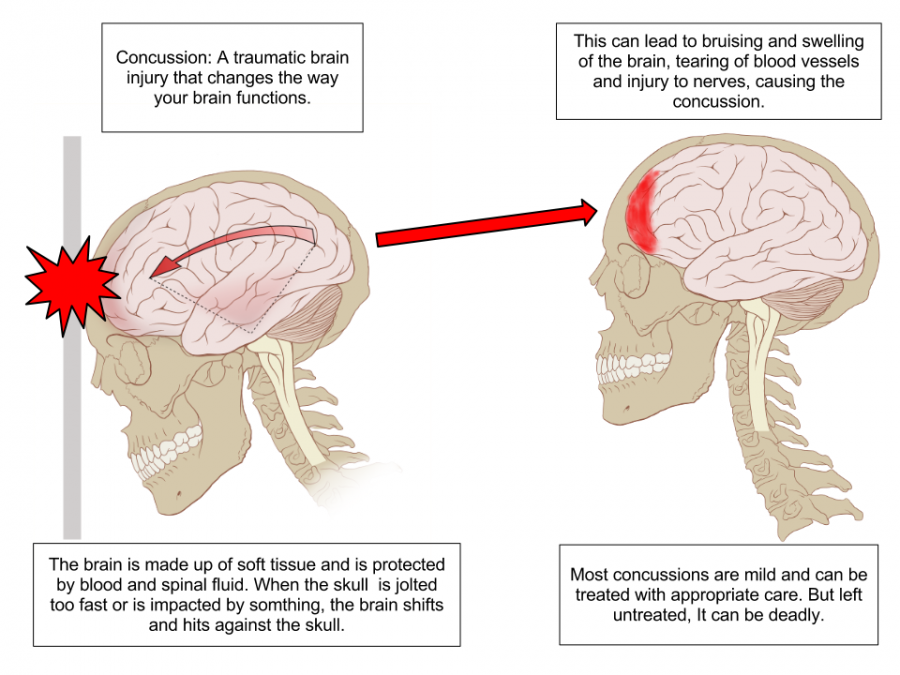Trauma to the Mind
Sport Concussions Have Terrible Consequences
Nicole Smith, a junior at the University of Rhode Island was a promising figure skater. During the summer of 2012, when she was a junior at Bridgewater High School, disaster struck. Smith was speeding across the ice when she fell and hit the back of her head on the ice. Sliding, she then hit her head against the boards surrounding the ice surface. Smith was a promising figure skater, but her greatness would have to wait. She had suffered a traumatic brain injury, more commonly known as a concussion.
In his pamphlet “Concussions in Sports” Dr. Dan Muse, a certified impact consultant and medical doctor at Brockton Hospital describes how concussions affect the brain. “During a concussion the brain is shoved against the skull, through a direct impact on the head, or from a person moving at a high speed and coming to an abrupt stop. The brain is then shaken around like a yolk in a chicken egg.” Normally, the brain is protected by a substance known as cerebrospinal fluid or CSF. The force of a concussion prevents CSF from doing its job of “protecting and cushioning the brain.” The result of this trauma is often “headache, nausea, memory loss, lack of sleep, lack of concentration, and confusion.” According to Dr. Muse, “An injury to the brain damages the brain at a cellular level, which can permanently destroy connections in the brain, which can cause mental diseases later in life.”
After a concussion, it can be difficult to perform basic functions like getting out of bed, sleeping, walking, sitting, concentrating, and even just being in a room with light. And, that is exactly what Smith experienced after her accident. “After a week, I still had a hard time functioning normally, focusing, concentrating, and I was experiencing headaches; I was highly sensitive to light, and sleeping was an issue,” said Smith.
For the next year and a half, Smith experienced the symptoms of a concussion; she was sensitive to light and noise, had trouble concentrating, experienced severe headaches, and sleeping proved to be a very notable issue. “My school work suffered; my entire junior year of high school I only went half days. Any loud areas or places that required me to concentrate and focus for a long period of time agitated the symptoms; I couldn’t concentrate or focus on anything at school for more than a few minutes.” Smith remembers taking melatonin for sleep but says, “It didn’t help at all.” She did take a low dose antidepressant for nerve pain that was beneficial.
After Smith’s junior year in high school she returned full days. But, the effects of the concussion are still evident to this day. “I’m still really sensitive to light, I can’t go outside without wearing sunglasses. Even when it’s cloudy, I still need to wear sunglasses when I’m driving. Whenever I do, I get headaches, they are more intense than before I had my concussion,” said Smith. She has since returned to figure skating, but now acts more cautiously when she is on the ice. She did experience another concussion after returning, but the severity was not as extreme.
Of course, the stress and anxiety caused by an injury is not limited to the athlete. Often their family and friends are affected to. After Smith sustained her concussion, her mother says she was “in a state of constant distress,” not knowing if her daughter would ever fully recover from the trauma she had been through.

Cam, this year's Production Manager, is a member of the class of 2020 and joined the Green Wave Gazette his sophomore year as a Staff Writer with a special...

